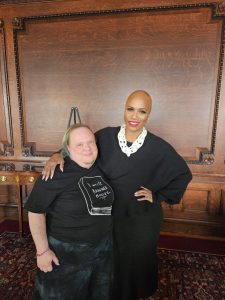 I had the honor of attending a roundtable on book banning convened by Congresswoman Ayanna Pressley in the Library of Congress! She is introducing #BooksSaveLives legislation and we met to talk about current issues in the field, messaging, etc. I had the honor of attending a roundtable on book banning convened by Congresswoman Ayanna Pressley in the Library of Congress! She is introducing #BooksSaveLives legislation and we met to talk about current issues in the field, messaging, etc.
Of special note, I responded to ye olde “parents can decide what books their kids read” with the point that all young people deserve access to information and stories, including kids that are in homes where it is unsafe for them to be themselves.
The full meeting is here: https://www.youtube.com/watch?v=boGK-p-dKVw&t=1378s Unfortunately, they didn’t get a good mic until after I spoke, but I give my remarks starting at minute 21.
Here are my written notes (I stuck pretty closely to the script):
I’m Alex Gino, author of five middle grade books with LGBTQIA+ characters and themes, particularly transgender and nonbinary kids figuring out who they are and finding community. My debut, MELISSA, released in 2015, won Stonewall and Lambda Literary awards and has been published in 16 languages. It was one of the first traditionally-published books with a trans character for 8-12 year olds, and the first by a trans author. It was also the #5 most banned and challenged book according to the American Library Association in 2016. In 2017 it was #3. And #1 in 2018, 2019, and 2020. It’s not an honor.
The books that are banned and challenged serve as a spotlight on the issues that the larger culture is wrestling with. Books that explore queerness and racism dominate the lists, and children are being used as a proxy in a culture war. And right now, books by Palestinians and Palestinian-Americans are in that hot seat. A couple went to a public library in NYC and took out half a dozen children’s books about Palestine, and has announced they don’t plan to return them. A single patron can wipe an entire culture out of a library’s children’s section. That terrifies me.
Humanity is in narrative. Statistics and data are important, but humans are moved by emotions, and emotions come from stories. Individual people and situations, and seeing the connections between us all. When you take away stories, you dehumanize people. Kids are learning about the world, and they deserve to know who’s here, whether it’s about finding themselves or about growing into a person who sees others for who they are. The alternative is an adult who is not prepared to be part of the beautiful, diverse culture they are part of.
I’m a storyteller, so let me tell you a brief story. Imagine a late night alley. Street lamp flickering in and out. It’s drizzling, for ambiance. And down this alleyway, a guy is walking. Pingponging really, between the buildings, drunk as the proverbial skunk. Relying on a few stereotypes, he’s a bro-dude-type. Cisgender, straight, loves sports. And in the other direction, he sees someone approaching he perceives as a trans woman. May not be a trans woman. May not be the first he’s seen that day. But his drunk brain reads her, and goes, “ohhh, that’s a TRANS woman. Like Melissa. Remember when Ms. Roberts read that book to us? It was so good!” And he goes home. And SHE goes home. Because transness was humanized for him. And if you didn’t fear for that trans woman, that’s a cisgender privilege I can’t imagine. I still fear for her, and I’m the one telling the story.
There’s a reason we say Books Save Lives. Queer lives. Black Lives. Palestinian Lives. People deserve to read books with people like and unlike them. Including young people. Especially young people. And in so doing, we protect our collective humanity.
I recently got an email from a teacher asking about the bully in my first and third books: Jeff. The reader was hoping for redemption for Jeff, and referenced The Julian Chapter by R.J. Palacio, in which the main bully of Wonder gets a backstory to explain his behavior. I’m not copying the email here for anonymity, and because it’s not about this specific reader. The question has come up before. But I took the time to answer it fully, and wanted to share it here, both for general reading and so I can point to it next time:
Dear Xyz,
This comes up from time to time, and I’d like to respond to the question genuinely, if critically. I hope you’ll trust that this comes from having thought about this a lot over the last few years, and know that you’re not the only person to ask about it.
Frankly, that’s not the type of story I want to write. I don’t deserve to spend my queer energy on redeeming the kind of person I’ve had to deal with all my life. There are too many LGBTQIAP+ kids out there who need stories that focus on them, not to mention adults like me who never got them growing up, and that’s what I intend to continue to do. Besides, so much of the world’s energy is bent on excusing and second-chancing problematic straight white guys, and I don’t intend to comply.
That said, I am toying with a third book in Melissa’s world, and with Jeff still having issues, it’s probably time for him to get some resources. Not redemption or explanation, but as way to change. However, it is not going to be the responsibility of any of my LGBTQIAP+ kids to help or forgive Jeff. Adults will be responsible for that, probably mostly off-page, since it’s not who the story is about, and on the other side, none of my queer kiddos are going to suddenly become friends with Jeff – that’s not their desire or responsibility.
And if Jeff continues to be a bully, or queerphobic, or whatever he is, I don’t think that’s a bad thing. There really are people who don’t change. However, seeing that bullheadedness just might push someone to realize that maybe they’ve been a bit heterosexist and could do with some growth. I’d rather real kids learn and grow than my foil of a side character.
I see this as the heart of the difference between writing within community and writing outside your experience, and, to be honest, it’s my biggest critique of Wonder. As though Auggie’s life is a learning experience for the other characters in the book. The story never comes back to Auggie, and he gets an award for being inspirational to other people. The story isn’t about Auggie; it’s about how admirable the school is for accepting him.
Thank you for reaching out and I hope that you’ll let these thoughts sit with you, and the next time you’re reading a book with a marginalized character, you’ll pause to think about who is humanized and who is a device for others’ humanization.
Best wishes,
Alex
Update 12/16/21: Great news. Sometimes the work is worth the effort! They responded to say, “I have reread your email many times and I will continue to look back on what you wrote, sit with it, and learn from it”, along with thanks for my time and an awareness that emails like that must get tedious. Yay team reach out.
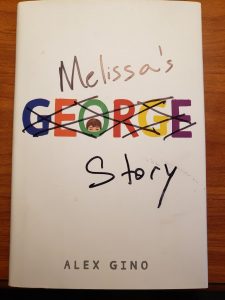 The author’s copy. Reader fixes below. Edit Oct. 28 2021: Hurray! My publisher, Scholastic, is officially changing the title to Melissa! Read more about the change in this Publisher’s Weekly article as well as my thoughts at the On Our Minds Scholastic blog. And download a new printable cover here or fill out this form for a sticker. You can also still, of course, engage in #SharpieActivism and fix your own cover.
I made a mistake when I named my first published middle grade novel. A big mistake. I used a name for my main character that she doesn’t like for herself (i.e. George, the title of the book) instead of her actual name. My main character’s name is Melissa, and I apologize to her, to the larger trans community, and to all of my readers for the error. I’m sorry.
She is not real, so I can’t hurt her feelings, but the title of my book makes it seem as though it is ever okay to use an old name for a person when they have provided you with a different name that works better for them. I want to be clear – it isn’t.
I know. The cover is beautiful. Iconic, even. But here’s the thing: so many transgender people have been told that we are beautiful/handsome as a reason not to transition, myself included. We are told that we will mar something special, as though looking pleasant to others is more important than being ourselves. As if it’s not more important than seeing who’s really there, scars and all.
Within the story, I think the disconnect between the name George and the pronoun she is a valuable literary technique and reflects the tension many trans people feel, especially before coming out to others. There’s a purpose to it, though it’s still a questionable choice for an omniscient narrator. But on the cover? It is an unequivocal error. Using a person’s name is a basic form of respect, and I failed my main character.
There are literally tens of thousands of people who have heard of my book but haven’t read it, and for whom George is the only name they have for Melissa. People who have gotten yet another cue, this time from a nonbinary writer who advocates for LGBTQIAP+ youth of all places, that a trans girl “starts out as a boy”.
And yes, I know, there are a few women named George and Georgie out there, (looking at you, Charlotte Ritchie’s character in Feel Good). But the quirkiness of the name for women works precisely because the name is coded male, and for Melissa, the name is a reminder of all of that coding. Hearing yourself called by the wrong name can feel invalidating. Hearing yourself called by a name associated with a painfully ill-fitting identity that has been thrust upon you? Yuck.
So, how did I make such a giant, bumbling error? Well, here’s the explanation. Not as an excuse, but for transparency and to give a little insight on how swiftly culture is shifting with respect to trans youth. As I was writing, I jokingly called my manuscript Girl George. You see, there was a flamboyant singer from the 80s named Boy George, and my title was a play on that. But not only is that not actually very funny, it also doesn’t fit my kid/pre-teen demographic.
When I sold the book, my publisher advised that we take the word girl off the cover. And while many of the details of that time are lost to a flurry of excitement and disbelief, I remember that moment, and how the idea raised the hairs on my feminist neck. You’re going to do what to the word girl? But then my editor pointed out that the word girl was a barrier to access because there would be some people who wouldn’t give the book to a boy if it had the word girl on it. Note that the concern wasn’t just that boys would self-censor, but that adult gatekeepers wouldn’t give boys a chance to make that decision in the first place. Aha, I thought, sneaky feminism. My favorite!
I didn’t really think about it much after that. I was still pretty stunned that my book was going to be published at all, and didn’t quite understand where my creative rights as an author ended and the sales goals of the publisher began. To be honest, I still don’t, but then, I didn’t even know to push. I was too swept up in being surprised and grateful to recognize my responsibility.
It’s also worth mentioning the rapid shift in much of culture with respect to trans people, especially trans/gender non-conforming youth. I started writing Melissa’s Story in 2003, back when the idea that a trans kid would be listened to and allowed to be themselves was mostly an impossible dream for most of us. The concept of “deadnaming”, or calling a trans person by the name assigned at birth against their wishes, didn’t really come into existence until 2012. (Note that this term is itself questionable, since the idea of calling someone’s former name/identity “dead” isn’t actually all that great for all of us.) I made endless changes to the book to reflect changes in culture, but like missing the forest for the trees, I didn’t see the damage inherent in the title, whether or not “girl” was included.
I wish I had realized to speak up then, and I wish I could change it now. But it’s not mine to change anymore. Yes, publishers correct mistakes in new printings of books all the time. But when the mistake is the title, it’s harder to get the change made, especially if the book is successful.
So what do I do now? What do we do now? Well, maybe we’ll hit a cultural tipping point where the social outdatedness of calling a trans girl by her name assigned at birth makes the need for the change obvious. I’m not actually that hopeful of that, but also, I never expected to see gender-neutral bathrooms in elementary schools, and yet, here we are.
Which leads me to the tweet I made last week:
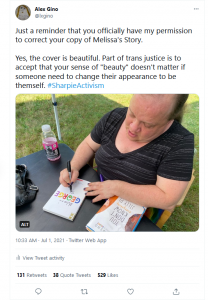 The picture is of me at a recent, outdoor event changing the cover of someone’s book before signing it. The text reads: “Just a reminder that you officially have my permission to correct your copy of Melissa’s Story. Yes, the cover is beautiful. Part of trans justice is to accept that your sense of “beauty” doesn’t matter if someone need to change their appearance to be themself. #SharpieActivism” The picture is of me at a recent, outdoor event changing the cover of someone’s book before signing it. The text reads: “Just a reminder that you officially have my permission to correct your copy of Melissa’s Story. Yes, the cover is beautiful. Part of trans justice is to accept that your sense of “beauty” doesn’t matter if someone need to change their appearance to be themself. #SharpieActivism”
And that’s where I’m at now. I can’t change the system, but I can change my actions. I can’t change every cover, but I can change mine. And you can change yours too. (Note: I can only endorse fixing copies you own.)
So maybe part of the process of reading Melissa’s Story (for now, at least) is to get to the end and fix the title yourself. Call it interactive reading. Heck, when you give Melissa’s Story as a gift, include a permanent marker.
So fix your copy! Do it up! Creativity is queer! Share a photo of your cover on twitter with the hashtag #SharpieActivism. Other social media too, I guess, but I’m not on those. 🙂 Or email me at alex@alexgino.com with a photo and name you’d like me to use to share yours and I’ll post it here. [Note: the gallery is now closed to new entries.]
P.S. Librarian-type folks? The OCLC master has been edited so if you re-download, Melissa’s Story should appear as an alternative title.
READER FIXES!!
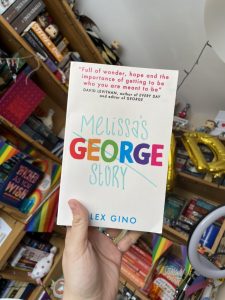 Look at Ren’s beautiful handwriting!
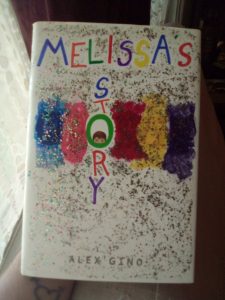 Adrien kept it understated.
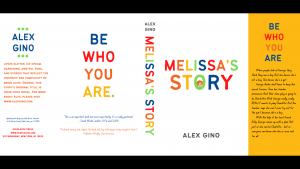 Check out this downloadable dust jacket by Ashlee Brown of the Kenton County Public Library!
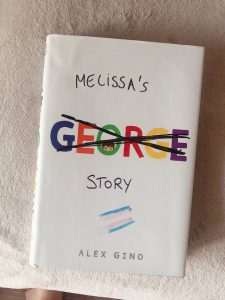 Jules included a flag motif!
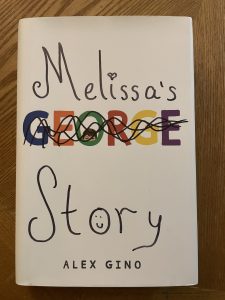 Nicki nailed the middle grade handwriting!
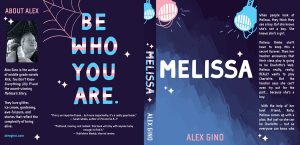 What a lovely dust jacket from Mars!
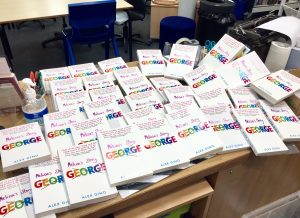 Jane Hill (@codenamejane) has taken it large scale for a class set!!
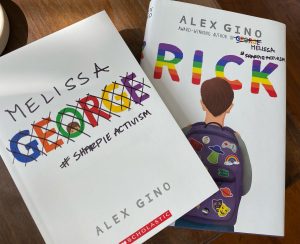 Heather Beztilny remembered to fix RICK as well!
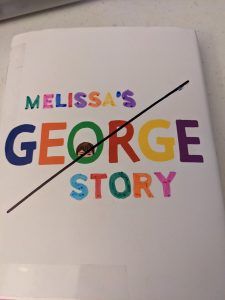 Check out this lettering work by family health librarian Emily P (@HealthLitLib)!
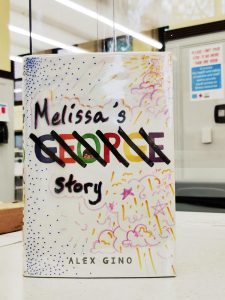 Jenny’s design style is super!
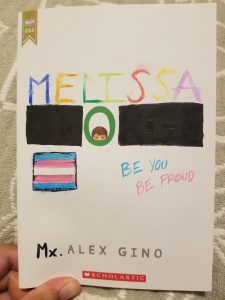 Ash (IG: @ashtheblackram) made sure to leave Melissa alone in her O for trans visibility.
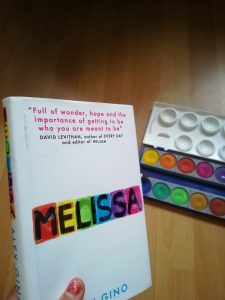 Cynna Moon (IG:@i.am.cynna.moon) brought out their paint set!
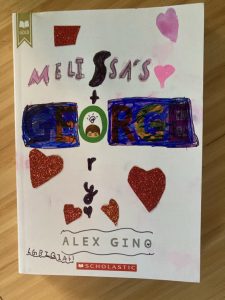 Sisters Layla and Julia collaborated on this sparkled up beauty!
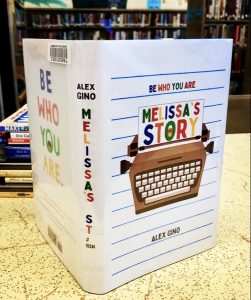 Check out what the Oakley Branch of Buncombe County Public Libraries in North Carolina!
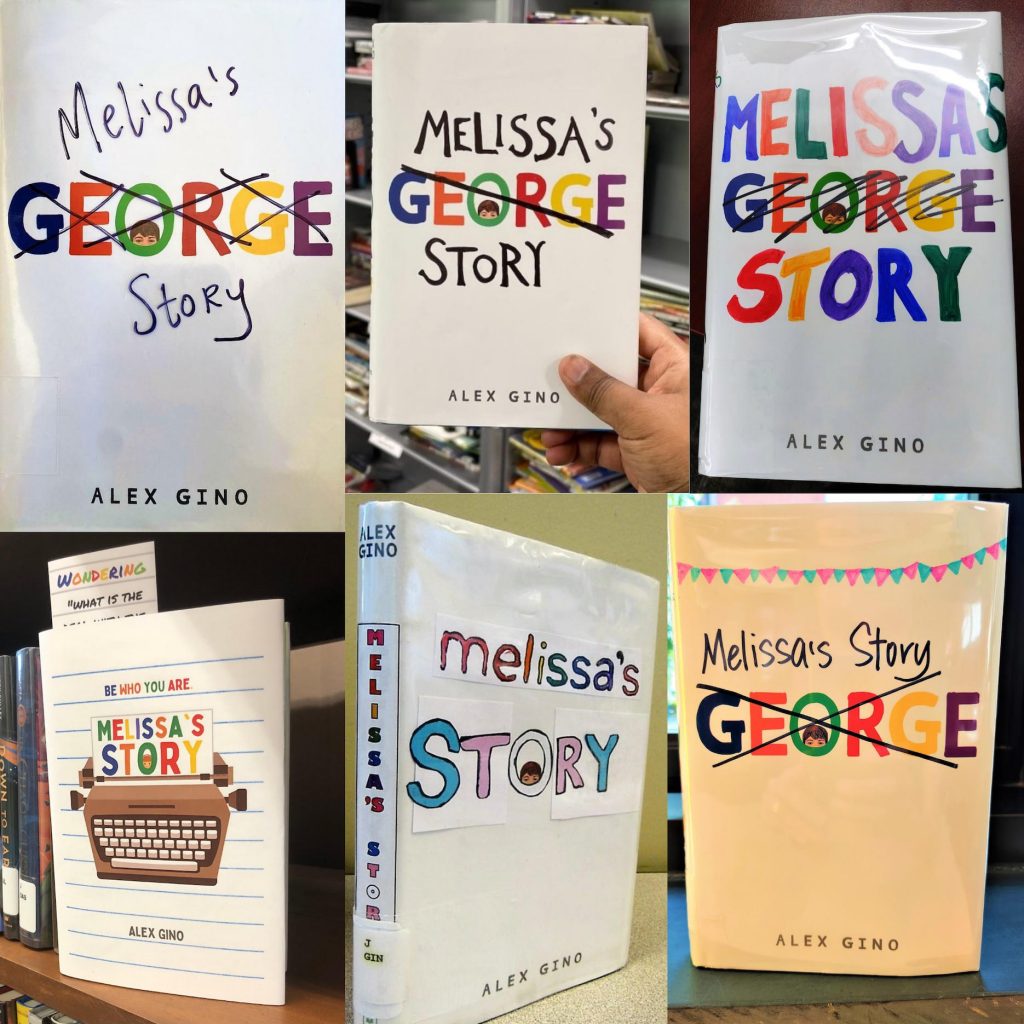 Not to be outdone, the other branches of Buncombe Public Libaries show off!
Thanks to all for your support. This gallery will no longer be updated, now that the title change is official!
In celebration of Deaf culture, here are some amazing living Deaf artists for you to check out. I will be revealing one a day in the 30 days leading up to the release of YOU DON’T KNOW EVERYTHING, JILLY P! on Sept 25! For the most current names, check out on Twitter. (Note: This list is now complete!)
Aug 26: Hurray! begins today, and we’re starting with a middle grade powerhouse, Cece Bell! is the author of many titles, including EL DEAFO, the Newbery-winning, mostly autobiographical story of a Deaf rabbit with classroom superpowers! cecebell.wordpress.com
Aug 27: The best way I can introduce you to Cree hoop dancer Burton Bird is to show you him in action: Born Deaf, he feels the vibrations of the drums in his feet. He advocates for other Deaf First Nations people in Northern Saskatchewan.
Aug 28: If you watched Sesame Street before 2002, you know today’s celebrant Linda Bove, even if you didn’t know her last name. The first signer many hearing people knew is also co-founder of Little Theater of the Deaf and Theater! https://www.youtube.com/watch?v=262zTsGTEiE
Aug 29: As an actor, writer, director, and co-founder of National Theater of the Deaf, Bernard Bragg has supported and strengthened Deaf culture for over 60 years! In 1967, he was part of the first special to show Deaf folks signing on TV.
Aug 30: Filmmaker Jade Bryan is the 1st Deaf Black woman to earn a filmmaking BFA from NYU’s Tisch School! is an activist, documentary filmmaker and TV writer. Watch her sizzle reel for The Two Essences here:
Aug 31: Another filmmaker today on ! Jules Dameron. has an extensive directorial filmography, including ASL music videos with Deaf performers. She also coined the hashtag . See a trailer for “Reverse Polarity”and more at
Sept 1: Sean Forbes is a Deaf hip-artist from Detroit. Here’s his newest video, Watch There Hands: is also co-founder of the Deaf Professional Arts Network. Check out more videos at .
Sept 2: Jazmyne Huerta‘s photography catches people in all their beauty. She is self-taught, but learned additional skills at NTID. She works in Southern California and is available for weddings, baby photos, and more. https://www.dailymoth.com/single-post/2017/09/08/Deaf-Business-Spotlight-Jazmyne-Huerta-Photography
Sept 4: You might have spotted actor CJ Jones just a few weeks ago on the Hulu series Castle Rock, but his career in film, television and theater spans decades, all the way back to his appearance on A Different World in 1991! https://www.cjjones.com #30DeafArtists
Sept 23: Rosa Lee Timm is known for her ASL music videos and storytelling, like this delightful one for Katy Perry’s Roar: also performs the “The Rosa Lee Show” and stars in ASL Films’ Versa Effect. Talk about !
Sept 24: What better way to wrap up #30DeafArtists than with rapper Wawa! @diphopwawa‘s music is catchy and his videos are visual delights, like Bounce With Me!: https://www.youtube.com/watch?v=PeABxQf25nk More, including digital album Deaf: So What? at: https://www.diphopwawa.com/ #DeafTalent
Hey folks! I’m writing more postcards to voters in April, and I invite you to join me in sending at least 10 postcards to likely progressive voters to encourage them to vote in special elections.
Why: First off, you will have brightened peoples’ days with handwritten postcards and bettered democracy. Plus, one person will get a signed Advance Reader Copy of YOU DON’T KNOW EVERYTHING, JILLY P!, which won’t be available in stores until September 25! And everyone who enters will get a postcard from me.
To enter:
1) Sign up with postcardstovoters.org if you haven’t already
2) Send at least 10 postcards for an upcoming election
3) If you can/want to, post about it to social media. [Edited to make this not a requirement.]
4) Email me at alex@alexgino.com with your address and social media handle if you posted about your cards.
Why postcards?: Special elections are happening all the time around the country, and results are often determined by turnout. I hate making phone calls to potential voters, and I suspect many of them hate getting them, but who doesn’t love a postcard? I find it relaxing to make cards that say things like “Local Elections Change the World”.
Access notes: Participating with postcardstovoters.org does require handwriting and the funds to buy stamps and supplies. If you are interested in participating, but handwriting doesn’t work for you or your body, I’m up for substitutions. Email me at alex@alexgino.com and we’ll set something up. If you are interested in participating, but it’s cost prohibitive, email me at alex@alexgino.com and I can see about sending you a few dollars to make it possible.
Authors, by and large, love fan mail. Hearing that readers were touched by our stories and love our characters as much as we do, if not more, is a joy. And letters from kids are the best of them! They are honest, heartful, funny, kind, sincere. Good stuff! So I was delighted to see an email in my inbox this morning that started “I am in seventh grade at” and prepared to read it over morning coffee. But then I opened it and found, effectively, a book report in letter format.
Now, not everything in the email was bad. It was quite mixed with a generally positive, if ciscentric, bent. It was an honest, genuine, book report. Relatively thoughtful, even. I LOVE students questioning and critiquing what they read. I even appreciate when kids email to tell me something they didn’t like about the book. The fact that a kid was so much by my writing that they want to talk with me about it? Bring it on.
But this was a book report, complete with a few “some evidence of this is” lines and an unusual preoccupation with inciting incidents. It is a solid assignment. And it should have remained in the classroom. This critique of whether my book has a sufficient inciting event to qualify as realistic fiction should not have been sent to me. A conversation about the balance between characteristic traits and prescriptivist definitions would be a fascinating classroom discussion and could give students a fuller understanding of genre. But it’s not the author’s job to defend their work in this way.
Rather than take my frustration out on a seventh grader completing their assignment, I wrote to the two 7th grade ELA teachers at the school in question. (The internet truly is fabulous.) I heard back from one, who said one of the goals of the project is to provide authors feedback from their demographic and wanted to know how I recommended they change the assignment. It’s as simple as this:
Don’t actually mail “Letter To The Author” assignments unless you think they will be enjoyable and/or valuable for the author. This goes triple for authors who are marginalized in ways the student is not.
Now I’m not saying that everything I receive needs to be glowing. But to have a seventh grader emailing me because she personally doesn’t think the idea of a trans fourth grader is realistic? I have spoken with plenty of elementary school-age trans kids who would say otherwise. And I have spoken about the importance of trans youth in elementary age settings and the age appropriateness of my characters countless times, including both in this blog and in the FAQ for the paperback edition. It’s cisnormativity being thrown in my face. Again. (Hint: If you are coming from a place of privilege and have something to say to someone from a marginalized community, I 99% guarantee you they have heard it before.)
Further, this is a completed published work of fiction. Your students’ unvetted ideas of how the book should have ended aren’t actually helpful to me. I mean, it’s sweet if a kid takes it on themselves to tell me their thoughts and I smile through those responses and inwardly grumble as I encourage them to engage in fan fiction. But for a teacher to make it an assignment that includes questions for me to respond to? Why are you throwing that labor at me? You know writers are real people, right? And we read our email. And many of us want to reach out to readers to take the time to reach out to us. But assignments like this make the whole idea of being accessible feel icky.
Also? I, and many children’s book authors, go to schools and talk with kids. We have kids in our lives. You are not doing us a service by letting us know what a “real live kid” thinks.
But what bothers me most about this letter is that it’s a wasted opportunity for communication literacy. What is appropriate to share with whom and when? What is your goal and purpose in communicating? Who is your audience and how will your words be received?
One more thing. Let’s look at the numbers. What if 10% of teachers gave an assignment like yours once a year. Let’s be limited and just look at seventh graders in the US. According to the US Census, there were about 54 million kids ages 5-17 in 2010. Assuming the spread is even, that’s roughly 4 million seventh graders, or 400,000 letters. Pulling a generous number of 10,000 children’s authors out of thin air, that’s still 40 letters per author per year. Multiply that by, say, the rest of 3rd through 7th grades, (how Scholastic tends to market middle grade titles), as well as English speakers through the world, and that’s a lot of unsolicited feedback. Could you imagine getting notes on your desk from your students that question your pedagogy, techniques, and efficacy?
The good news is that these numbers remind me that most teachers recognize that this is not an appropriate assignment, as these emails are pretty rare for most writers I’ve talked to. We get them, but maybe a few a year. I’m still convinced that’s a few too many. But then there are the big name authors. I can only imagine how many emails Rick Riordan’s assistant has to trash a day.
So here I am, spending my daily word count on this blog post. “Should” I? “Shouldn’t” I just let it roll off my back? I’m gonna call BS on that. (BS=Beat-it Should!). It’s in writing about it that I get the thoughts out of my head and clear to get back into other projects. And given that I’m not the only one who gets these emails, I may as well share my thoughts, so that folks who wish to can point to this post or adapt any language that works for them.
To sum up, if you are a teacher and your student wants to write an author, encourage it! If you give an assignment for students to “write” an author, don’t actually have them send it. Do what we did back in the 80s. Mount it on a piece of construction paper and staple it to a bulletin board. And if there’s a really cute one that would give us a smile, send it along! Otherwise, let us be so that we can be focusing on writing the next book.
Author notes:
1) I am specifically referring to “book report” type emails here. Most authors LOVE receiving “thank you” type messages from kids. And if you have nondigital media for us, get in touch. Many of us are happy to provide a mailing address to receive handwritten notes.
2) All thoughts here are my own. Other authors have every right to disagree with me.
3) Author is currently in limbo being having sent off the page proofs for my second book and the beginning of distribution of Advance Reader Copies that sparks the beginning of “pre-book season”. Author then had a brief email exchange that set their angst alight in a cranky blaze. Author wished they had a blog post to point to. So, amongst all of the other problems we’ve got in the bizarreness we call 2018, here we are.
People have been goofing on my name and pronouns since I started telling people what they were almost twenty years ago. (Let’s be real, people have been goofing on my pronouns since I was born, but that’s for another day.) Twenty years of apologies. It’s gotten old.
At one extreme, there’s the overstrained and beleaguered nonapology. “Ugh, I’m sorry. It’s just so hard. You know how it is.” Yeah. I know exactly how it is. I am such a burden. Thanks for the heads up that you are not in alliance with me. If you don’t see what’s wrong here, you’re going to have to seek elsewhere, because I’m not up for it.
But then there’s another kind of unpleasantness, which is the overapology. “Oh my God! I’m so sorry. I know better. Really I do. I was just [blah blah blah]. I feel terrible about it.” Which socially puts it on me to be “the voice of reason” and take down the energy: “Oh, don’t worry about it,” “It’s OK,” and so on. Even if you should. Even if it’s not.
I’m actually a little rattled at the moment and would like the conversation to go somewhere else even more than you would. If you’re someone I’m in with, I know you’re sorry. If you’re not, telling me that you are can’t break through my armor enough to convince me. You will show me more in your ability to take in what you have done and not make the next few moments about you.
And now there’s a new variant on the theme. In twenty-four hours, I received the following:
- A text from a friend within publishing that a mutual friend in publishing had used the wrong pronoun in a conversation with me and still felt terrible and passed on an apology
- An email from a friend who had used the wrong pronoun about me in social media, deleted and reposted, and wanted me to know they were sorry
- A conversation with an old friend whose sibling had used my childhood name for me and thought her sibling would stress about it less if they knew I was OK with them
Three times in 24 hours when, outside the moment of the mistake, I have been asked to take care of the emotions of cisgender people. Nope. Done. Nope. No ill will to any of these people individually – I like them all very much – but come on! Two of these are instances I never even needed to know happened. And to be honest, I didn’t even remember the first one outside the moment – I get so many pronoun slips I can’t keep a tally. You’re not *that* special. And further, two of these are a person removed. But someone had to let me know they felt BAD.
And yes! You feel bad. That’s called shame. Awesome! We’ve gotten to a place where you see that your mistake is yours, not some special request I’m making. So what do you do?
Well, first, I suggest you do what I try to do. (And yes, I mess up on pronouns, including my own. Enculturation starts early and runs deep.) Apologize and move on. And in fact, I’m trying to move away from the phrase, “I’m sorry,” which often comes with the expectation to accept the apology, towards the phrase, “excuse me,” which is what you say when you fart. You stunk up the air. It happens. It can’t be undone, but let’s not dwell on it, OK?
And then, I’m going to challenge you to take it one step further. Brene Brown talks about shame being connected with silence, and the answer to shame being honesty. So what I want you to do is to talk to a cisgender person about it. And if someone comes to you with a story like that, please *don’t* go back to the trans person about it, even if they ask you to. Sit in it together. Share your feelings. Grow closer. Do the work yourselves. And maybe as a bonus, you’ll be less likely to goof in the future, because you got to be there, instead of hiding from it.
Here it is again, in three simple steps:
- Say “excuse me”
- Move on
- Process your feelings with a cis person
Think of it as the modern Stop, Drop, and Roll. Good luck!
I’m deep in revisions on book 2, and sloughing off irrelevant words. The tone of this piece no longer matches my story, but given that I have this outlet here, it’s too cute not to share. So, I give you a sneak peek of something that will NOT be in my next middle grade novel!! Here you go:
Macy’s mom, Tricia, is driving us to school. On the way, Macy suggests a round of Kiss, Kick, Keep. One person names three boys – from school, or famous people, or whatever – and then the other person decides which one to kiss, which one to get rid of (kick) and which one to marry (keep).
I have challenged Macy with the members of the boy band 2 The Top. We both hate every single hair on their stupid heads.
“You are so cruel! Can’t I kick all of them?”
“Of course not!”
“OK, fine!” Macy groans. “Kick Mark. No question. Kiss Ray-Ray. And keep Bastian. I guess.”
“I knew it! But I’d kick Ray-Ray.”
“Which means you have to kiss Mark.” Mark is Macy’s least favorite member of the band.
“Worth it.” I say.
“For what it’s worth, I’d kick Mark, kiss Bastian, and keep Ray-Ray!” says Tricia.
“Mom!” Macy exclaims. “Are you listening in on us?’
“Macy, dear, you’re a whopping three feet away. And why are they always boys, anyway?”
“MOTHER!” Macy presses her palms into her eyes, and her cheeks peek out pink between her wrists. Then she looks up in horror. “Wait, are you trying to tell me you’re a lesbian? Are you going out with a woman tonight? Be honest!”
“Macy, my love,” Tricia’s voice melds kindheartedness and sarcasm, “Item number one: I am seeing a man tonight. Item number two: that would not preclude me being bisexual.”
“MOM!” Macy shrieks.
Tricia continues undisturbed. “Item number 3: I am not bisexual, though I did kiss a girl once.”
“MO-OM!!”
“Item number 4: none of this is any of your business.”
“Then why are you even telling us?!?”
“Because you turn such an adorable shade of red when you get huffy.”
Here’s a close approximation of the speech I gave at ALA on Monday, June 27, 2016 on accepting the first ever Children’s Stonewall Award:
Good morning! I’m honored that you’re here. I’m honored that I’m here. First a few thank yous:
- To the Stonewall Committee, especially the Children’s & Young Adult Sub-Committee, and to Larry Romans and Michael Morgan, for understanding the importance of LGBTQI+ literature for young people.
- To friends and family, especially Jean Marie Stine, without whom Melissa’s story would still be a mangled mass of words.
- To the Timucua and other native people whose land this is.
- Sparkles and love to my agent, Jennifer Laughran, who revised and resubmitted my query into a book.
- Sparkles and love to my editor, David Levithan, and everyone at Scholastic who took this book on and wouldn’t let go.
- And endless gratitude to the booksellers, teachers, educators, and of course, LIBRARIANS, who are getting Melissa’s story into the hands of kids.
Last year was my first ALA. It was also Pride weekend in San Francisco, and Friday was the Trans March. I was in a car that evening, on my way to an ALA event. We passed by the march, and someone I was in the car with commented, “Look at all the bright colors!” Like they had just witnessed a pride of lions. (Or bears. Or otters.) Like we were on safari and had spotted the local fauna.
That very same day, gay marriage passed. And there were people at ALA who were congratulating me for it, as if I had personally accomplished something.
But here’s the thing: gay marriage has never been the top priority for trans people and marginalized queers. It’s barely in the top ten. The first priority for trans people is staying alive. The second is being ourselves. And while some people said, “Love Wins”, we sat nervously, because we know that progress on that long jagged arc towards justice brings backlash, which more often than not falls on the most marginalized parts of a community.
So for me, personally, and for my book GEORGE, it’s been an amazing year. I’ve been to dozens of bookstores and community centers, spoken to hundreds of kids and schools, met whole classes who read Melissa’s story. I’ve gotten countless emails, from adults and kids, trans and cis. One of my recent favorites was a tweet from the mom of a seven year old. They had just finished reading the book, and her daughter had declared her stuffed bunny trans. What a delightful and playful way for this kid to incorporate transness and how to ally with trans people into her understanding of the world.
At the same time, there are places that aren’t purchasing my book because of “content”. It’s been placed on special shelves in libraries, arbitrary minimum reading ages have been declared, it’s been disallowed for book reports, and an amazing speaker and author in his own right has been disinvited for booktalking it. Melissa’s story has literally been pulled out of children’s hands. Because for all the progress, there’s backlash.
And now, here I am, accepting a queer literature award in Orlando, Florida, where we just lost 50 people. Mostly queer. Mostly Latinx. Mostly in their 20s. And not only because of extremists in our country who don’t understand the meaning of “well-regulated” or what a musket is. But also because of internalized homophobia. And because progress brings terrifying, tragic backlash.
I’m sharing the sad part. In the story arc, it makes the redemption more powerful. Because what do we do in the face of backlash? We progress boldly beyond it. We keep going.
We don’t control the past. We barely have a handle on the present. But we can guide the future.
And that’s why writing middle grade fiction is so important to me. Ages eight through twelve are a critical time in figuring out who we are as distinct from friends, from family, from school, society, and the media we take in. These are formative years and young people need and deserve tools to help them make sense of their world.
I have this image that runs through my mind. It takes place 10, 20, 30 years from now. A cisgender, heterosexual, heteronormative, dudey-dude-bro, football playing, fraternity faithful guy is walking down the street. I mean, Dude-Bro. Total stereotype. Drunk as drunk on PBR at 4 in the morning. And in the other direction, walking towards him, is someone he identifies as trans. And somewhere in his notions and connections of transness, is Melissa’s story. And he thinks of Melissa as a person, and he sees the person across the street, and that real, live, possibly-trans person makes it through the night. And nothing happens. Nothing happens.
We book people say it because it’s true: BOOKS SAVE LIVES. BOOKS SAVE LIVES. BOOKS SAVE LIVES.
It is worth the risk to get books like George on your shelves. I know, especially for school librarians, that parents can be scary. But you have so much more agency that the kids who need to read stories like GEORGE.
And it’s not just trans kids who need to read trans stories. We all need to see each other as people if we have any hope of getting through the next century.
I am honored and delighted to be accepting a NEW award – for children’s LGBTQI+ literature, separate from the wonderful world of YA, because it means more quality queer literature for young people is coming. Books are consumable. We one and need another.
So once more, thank you. Keep reading. Keep sharing. Please. Kids need you.
A minimum of 103 shots were fired. Probably more. Probably lots more.
How long was the music still playing before the DJ noticed? How many people were still dancing as they were shot?
In about a minute, I said, and someone felt the need to correct me on my facts.
No more shootings, I pleaded, and someone tried to tell me my reasoning was inaccurate.
No more guns, I cried, and someone quoted a bible verse to tell me that Muslims would use stones instead.
And when I say someone, I mean white men. Probably straight. Probably cis. Probably non-disabled.
Definitely privileged.
It is a privilege to think that I’m making a rational argument, when what I’m doing is pouring a little bit of my heart on the page, both because it’s flowing over inside of me and because maybe if I share it, someone else will find what they need in it. If you think I’m open to discussing it, I didn’t write it for you.
I wrote it for those of us in pain today, knowing that we lost fifty lives, most of them queer, lots of them People of Color, many of them young and finding themselves and ready to great things in and for the world. They are gone.
And another fifty-three scarred and scared, wounded long beyond their injuries heal. They will never be the same, carefree to dance. No, they will be wondering who has the nearest gun.
And for Muslims everywhere who continue to live in fear because white America can’t grasp the chasm between religion and terrorism if the people we’re talking about aren’t white.
And for all of us. I feel society forging forth into the future. And I feel the weights of fear dragging us down, and back, and around and around through the maze to freedom.
I’m going to be in Orlando in two weeks, accepting the first ever ALA Stonewall Award specifically for Children’s LGBT literature. I was going to be a partying queer. Now, I don’t know.
I don’t know what comes next.
|
 I had the honor of attending a roundtable on book banning convened by Congresswoman Ayanna Pressley in the Library of Congress! She is introducing #BooksSaveLives legislation and we met to talk about current issues in the field, messaging, etc.
I had the honor of attending a roundtable on book banning convened by Congresswoman Ayanna Pressley in the Library of Congress! She is introducing #BooksSaveLives legislation and we met to talk about current issues in the field, messaging, etc.















